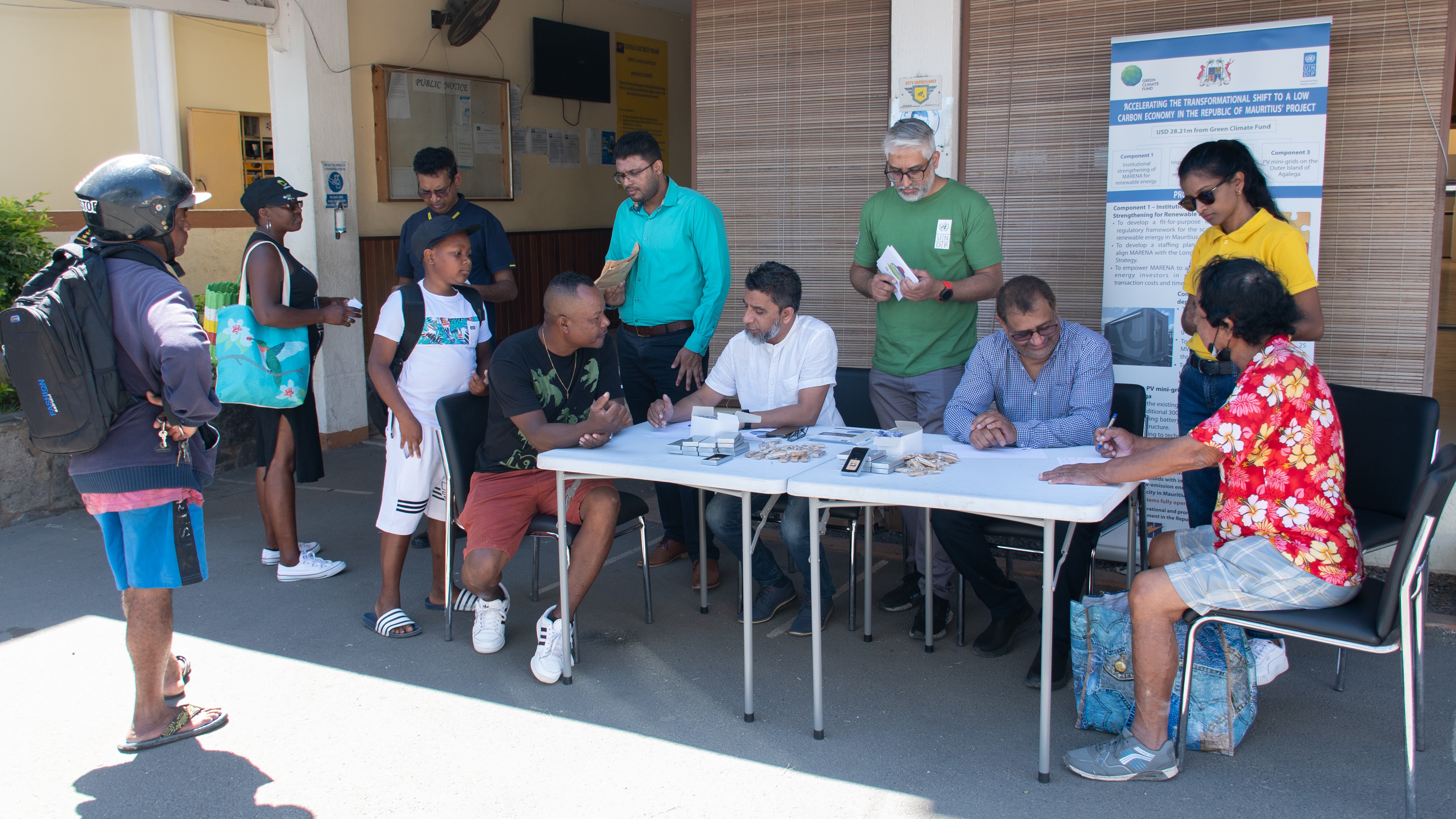Kick-starting the “Accelerating the Transformational Shift to a Low Carbon Economy in the Republic of Mauritius” project activities in Rodrigues
November 23, 2022

As part of a mission to Rodrigues between 4 and 11 November, the UNDP project team for the GCF project and CEB representatives promoted solar photovoltaic (PV) schemes during a public awareness in Port Mathurin
The UNDP project team for the GCF-funded "Accelerating the Transformational Shift to a Low Carbon Economy in the Republic of Mauritius" project (GCF project) was in Rodrigues between 4 and 11 November to kick-start project activities in the island. The team was accompanied by representatives of the Central Electricity Board (CEB), the implementing responsible party for Component 2 of the project, for this mission which allowed engagement with various local stakeholders to promote solar photovoltaic (PV) schemes and take stock of the island’s existing infrastructural capacity to produce energy from solar PV installations, amongst others.
Nationally implemented by the Government of Mauritius with the support of the UNDP, the GCF project, which benefitted from a USD 28.21 million grant from the donor organization, aims at helping the Republic of Mauritius to meet its target of supplying 60% of the country’s electricity needs from renewable sources by 2030, as per the 2021-updated Nationally Determined Contributions (NDCs). In its first phase, which ran between 2017 and 2021, the GCF project aimed to substantially strengthen the legal and regulatory frameworks, and upgrade the electricity grid, in order to boost the renewable energy proportion to the ambitious 60% target set by Government. In the second phase of implementation the project will accelerate the deployment of 25MW of rooftop, small and medium scale solar PV Installations on three earmarked target groups: residential buildings, NGOs and public buildings, on Mauritius Island, Rodrigues and Agalega.
During the mission to Rodrigues, the project team and CEB representatives met with the Chief Commissioner and the Deputy Chief Commissioner and other members of the Rodrigues Regional Assembly to present the project components earmarked for Rodrigues. These include (1) the deployment of rooftop solar photovoltaic (PV) systems on three building categories in the island, (2) training of technical staff and women in subject areas of renewable energy and solar PV systems, and (3) raising awareness amongst the local community on the CEB renewable energy (solar PV) schemes for low-income (Home Solar Project) and middle-income (SSDG Net-Billing Scheme) beneficiaries and their benefits. Technical meetings were also carried out with the Commission for Public Infrastructure, Environment and others to discuss and facilitate the implementation of the different PV system deployment schemes in the island.
Site visits were carried out at (1) the existing 1MW wind farm at Grenade which will soon be equipped with a 1MW solar PV Installation, (2) the 100kWp Community Solar PV Installation at Riviere Coco which Is currently able to provide some MUR 12,000 income on a monthly basis to the beneficiaries and (3) the 1.5MW Battery Energy Storage System at Pointe Monier power station.
A half day workshop was also organised on 10 November for representatives of NGOs, religious bodies, charitable institutions and public educational institutions. The workshop was an opportunity to present the solar PV schemes developed for these institutions. Under the GCF project, provisions have been made for the deployment of a total of 150kW of rooftop PV systems for NGOs and religious bodies under the relevant CEB Renewable Energy Scheme, and a cumulative capacity of 500kWp for public educational institutions in Rodrigues (under the CEB Renewable Energy Scheme for Educational Institutions). The PV kits distributed will be co-financed by part of the USD 28.21 million GCF grant and the CEB. Under these schemes, the qualified entities will benefit from the installation of PV systems by the CEB completely free of charge and receive up to 200 free units of electricity (kWh) on a monthly basis for a period of 20 years.
Addressing the participants of the workshop, Mr Johnson Roussety, Chief Commissioner of Rodrigues, highlighted the need for Rodrigues to shift from energy dependence to energy autonomy as importing fossil fuel for energy production represents a major economic burden to the island.
Mr Franceau Grandcourt, Deputy Chief Commissioner of Rodrigues, stated that the local authorities count on the buy-in of all local public and private entities in the shift to a greener economy and aim to install PV systems in all the public educational institutions. Mr Grandcourt emphasized that educators have a significant role to play in raising awareness on the benefits of leveraging renewable energy sources amongst the youth of the island.
The mission to Rodrigues also included training of National Empowerment Foundation (NEF) field staff whose support has been enlisted for helping to disseminate Information on the Home Solar Project schemes for low-Income households.
Two awareness sessions were also held for women, the first one in Pointe Monier on 9 November and the second one in Coromandel on 11 November. Around 50 women attended these sessions where they were introduced to basic concepts on solar photovoltaic energy, the CEB solar PV schemes and the job and training opportunities for women in the field of renewable energy.

 Locations
Locations














